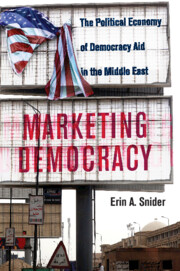Book contents
- Marketing Democracy
- Cambridge Middle East Studies
- Marketing Democracy
- Copyright page
- Dedication
- Contents
- Figures
- Acknowledgments
- Note on Transliteration
- Abbreviations
- Part I Introduction and Argument
- 1 Introduction
- 2 A Political Economy of Democracy Aid
- Part II Marketing Democracy
- Part III Securing Democracy
- Bibliography
- Index
- Cambridge Middle East Studies
1 - Introduction
from Part I - Introduction and Argument
Published online by Cambridge University Press: 24 March 2022
- Marketing Democracy
- Cambridge Middle East Studies
- Marketing Democracy
- Copyright page
- Dedication
- Contents
- Figures
- Acknowledgments
- Note on Transliteration
- Abbreviations
- Part I Introduction and Argument
- 1 Introduction
- 2 A Political Economy of Democracy Aid
- Part II Marketing Democracy
- Part III Securing Democracy
- Bibliography
- Index
- Cambridge Middle East Studies
Summary
This chapter introduces the argument and organization of the book. I explain the questions motivating the book, focusing on two that are puzzling in different respects. The first asks why democracy aid in the Middle East is seen as ineffective despite billions of dollars allocated for its promotion. The second question is linked to the first: Why would an authoritarian state even allow an outside actor to promote democracy? Examining the construction and practice of democracy aid illuminates why such regimes allow such aid as well as why particular ideas and conceptions about democracy persist even when shown to be ineffective. I introduce and explain the utility of a political economy framework that considers how ideas, institutions, and interests mediate and shape the form and function of democracy aid. I describe the methodology used in the book, which adopts an inductive, interpretative strategy to examine the construction and practice of democracy aid in the Middle East through case studies of US democracy aid in Egypt and Morocco.
- Type
- Chapter
- Information
- Marketing DemocracyThe Political Economy of Democracy Aid in the Middle East, pp. 3 - 25Publisher: Cambridge University PressPrint publication year: 2022

